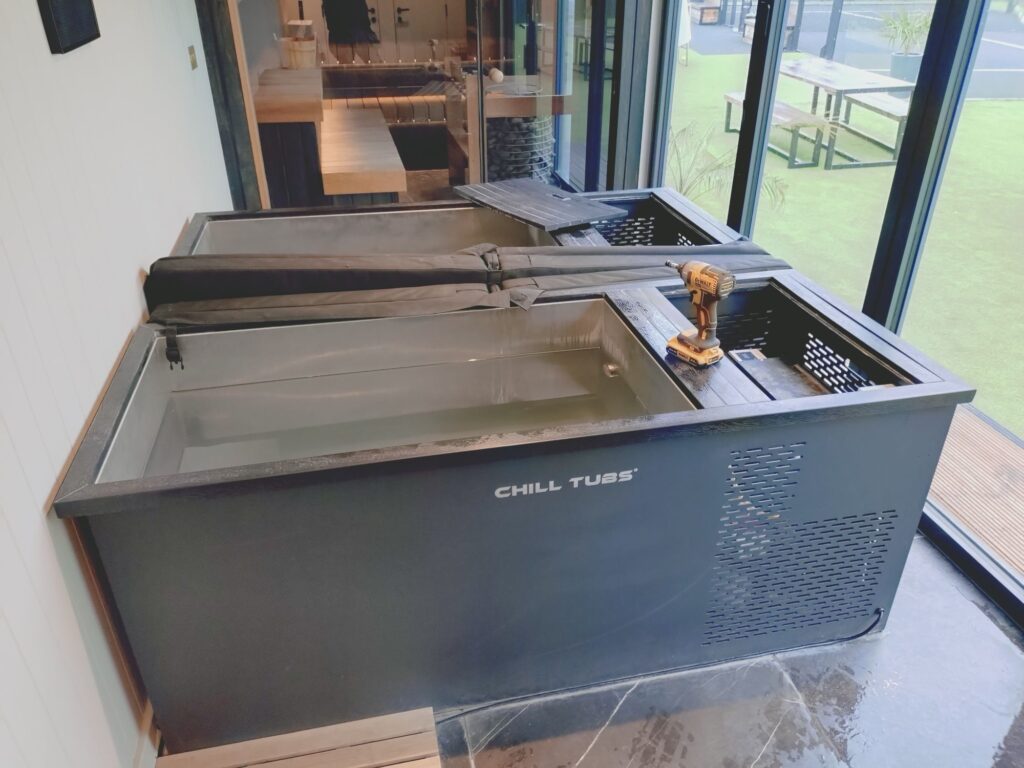Commercial Ice Bath Systems: Benefits, Importance, and Regulatory Compliance in South East England
Prepared for Subcooled Air Conditioning Ltd.
This report outlines the immense market benefits, importance, and specific legal and safety requirements for commercial cold water immersion (CWI) facilities, such as ice baths and cold plunge pools, operating across Oxfordshire, Buckinghamshire, Hertfordshire, Bedfordshire, Berkshire, London, Essex, and Kent.

1. The Benefits and Commercial Importance of Ice Baths
Commercial ice baths, often integrated into fitness centres, high-end spas, sports rehabilitation clinics, and corporate wellness facilities, are no longer a niche recovery tool but a mainstream wellness offering. Their importance spans physical recovery, mental health, and business strategy.
A. Physical and Therapeutic Benefits
Accelerated Muscle Recovery and Reduced Inflammation: CWI causes vasoconstriction (narrowing of blood vessels). Upon exiting, rapid vasodilation occurs, helping to flush out metabolic waste (like lactic acid) and delivering nutrient-rich blood to muscles. This process significantly reduces delayed onset muscle soreness (DOMS) and inflammation, allowing athletes and gym-goers to recover faster and train more consistently.
Pain Relief: The extreme cold acts as a powerful analgesic, numbing nerve endings and providing immediate relief from pain and acute soreness.
Improved Circulation and Cardiovascular Health: Regular, controlled exposure to cold water forces the cardiovascular system to adapt, promoting better overall blood flow and circulation over time.
B. Mental and Wellness Benefits
Boosted Mental Wellbeing and Resilience: The shock of cold water triggers a powerful physiological stress response, followed by the release of mood-boosting neurotransmitters like norepinephrine and endorphins. Regular practice trains the user to manage acute stress, leading to enhanced mental clarity, focus, and improved stress management in daily life.
Enhanced Sleep Quality: By lowering the core body temperature before bed, CWI has been linked to improved sleep quality and duration.
C. Commercial Importance in the South East Market
In the highly competitive wellness industry across London and the surrounding wealthy counties, offering high-quality, professional ice bath facilities is crucial for differentiation and retention:
Attracting and Retaining High-Value Clients: Health-conscious consumers and athletes seek premium facilities that offer state-of-the-art recovery tools. A professional, compliant ice bath solution elevates a facility’s brand and justifies higher membership or treatment fees.
Complementary Thermal Journey: Ice baths are ideally paired with heat treatments (saunas, steam rooms) for contrast therapy, which is highly sought after for boosting energy levels and enhancing circulation.
Meeting Growing Demand: The popularity of CWI, driven by media and wellness influencers, means commercial providers must offer this amenity to meet consumer expectations.

2. Legislative and Legal Requirements (UK Compliance)
Operating a commercial ice bath requires strict adherence to UK health, safety, and local authority licensing laws, particularly regarding water quality and public safety. Ignoring these requirements can lead to severe fines, facility closure, and public health risks.
A. Water Quality and Treatment Regulations
The primary technical compliance for commercial ice baths is governed by guidelines from the Pool Water Treatment Advisory Group (PWTAG), specifically Technical Note 71 (TN71). Key requirements include:
Filtration: The system must incorporate robust filtration to remove pollutants. Critically, water must be skimmed from the surface, as up to 60% of body oils and contaminants float.
Sanitisation: A fast-acting primary sanitiser, such as chlorine or bromine, is required. Slower-acting alternatives are not compliant for high-bather-load commercial use.
Secondary Sanitisation: UV treatment should only be used as a secondary method in conjunction with the primary sanitiser, not on its own.
Ice Contamination: Ice used to cool the bath must not be created from the contaminated water already used by bathers, as pathogens can survive freezing.
Monitoring: Water testing for free chlorine/bromine levels and \text{pH} must be carried out at least twice daily to ensure safe levels.

B. Health and Safety Executive (HSE) Requirements
All commercial operations must comply with the Health and Safety at Work Act 1974 and associated regulations, specifically focusing on the prevention of injury and illness.
Risk Assessment: A comprehensive risk assessment is mandatory, covering:
Cold Shock/Hypothermia Risk: Procedures for monitoring user time limits and ensuring adequate post-immersion warm-up facilities (e.g., thermal blankets, warm robes).
Slip Hazards: Management of wet floors and surfaces around the bath.
Emergency Procedures: Clear protocols for dealing with adverse reactions, fainting, or accidental falls.
Supervision and Training: Staff must be adequately trained in the risks of CWI and emergency response procedures, including proper supervision during sessions, especially if breathwork is involved.
Electrical Safety: All electrical installations, particularly chillers, must comply with the Electricity at Work Regulations 1989 and be professionally installed, especially in wet environments.
C. Local Authority Licensing (London and Home Counties)
In London, and often in other major boroughs (such as those in Oxfordshire, Kent, and Essex), commercial ice baths may fall under Special Treatment Licences (STL) or require compliance checks from Environmental Health departments.
London Local Authorities Act 1991 (Part II): This act mandates licences for premises offering “Special Treatments,” which includes “sauna, steam, spa-pools or other baths.” In the 32 London Boroughs, any facility offering CWI as a commercial service must contact its local council (e.g., Wandsworth, Tower Hamlets) to confirm if an STL is required.
Planning Permission: Installation of new facilities may require planning consent from the local council, especially if it involves structural changes or external units.
Legionella Risk Assessment: While cold water immersion systems typically maintain temperatures below the 20^\circ \text{C} threshold that supports Legionella growth, any complex plumbing or water storage system is legally required under COSHH Regulations to have a Legionella Risk Assessment carried out and regularly reviewed.

3. The Role of Subcooled Air Conditioning Ltd.
Subcooled Air Conditioning Ltd. is positioned as an essential partner for commercial facilities across the specified regions, bridging the gap between therapeutic desire and legislative necessity.
The company’s expertise in high-performance cooling and climate control is directly transferable to cold water immersion systems, ensuring they are not merely functional but fully compliant and commercially robust.
A. Compliance and Safety Engineering
PWTAG-Compliant Systems: Subcooled Air Conditioning Ltd. ensures the chiller, filtration, and sanitisation systems are correctly specified to meet the strict PWTAG guidelines for commercial bather loads, avoiding the use of non-compliant residential or adapted equipment.
Precise Temperature Control: The therapeutic benefits and safety of CWI rely on consistent, reliable temperature maintenance. The company’s expertise guarantees accurate and continuous temperature control regardless of ambient conditions or high daily usage.
Integration with HVAC and Water Management: The company can integrate the ice bath’s cooling and water management infrastructure with the building’s overall heating, ventilation, and air conditioning (HVAC) systems, ensuring efficient operation and compliance with all environmental and electrical regulations.

B. Regional Expertise and Service
Operating across the target area (Oxfordshire to Kent), Subcooled Air Conditioning Ltd. can provide rapid installation, maintenance, and compliance support, which is critical for high-volume commercial venues in densely populated areas like London. This local expertise ensures:
Seamless Local Authority Liaison: By providing systems with documented compliance, the company simplifies the process for clients seeking required local Special Treatment Licences and meeting Environmental Health inspections.
Reliable Preventative Maintenance: Commercial units require robust servicing to handle heavy usage. The provision of scheduled maintenance is vital for preventing system failure, guaranteeing water safety, and avoiding costly downtime.

Conclusion: The installation of a commercial ice bath system by Subcooled Air Conditioning Ltd. is a strategic business decision in the South East wellness market. By leveraging their technical expertise, clients not only provide a high-value therapeutic amenity but also secure full legal compliance, managing critical risks related to water quality and public safety. This adherence to strict UK regulations transforms the ice bath from a wellness trend into a reliable, professional, and profitable recovery asset.
